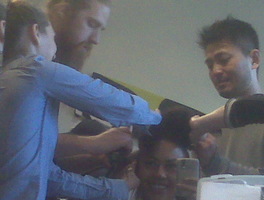
A few weeks ago, I was 'discovered' in the New York City subway when a casting agent from JV8 Inc. asked if she could take my picture. Next thing I knew, I found myself "making love to the camera" in the middle of the L Train platform on a Friday night. After all, what did I really have to lose (beyond my reputation that is)? What if I were part of some cruel social experiment to find out just how far women were willing to go (read embarrass themselves) at the mere suggestion they might actually be featured in a designer ad campaign like Liz Clairborne's?
 In fact, more and more brands are investing in the idea of creating real dialogue with their community using social media platforms and authentic communication. With acclaimed fashion designer Isaac Mizrahi at its helm, Liz Clairborne fans can join Mizrahi's Facebook discussion page and interact with Mizrahi's personal blog, video blog and webisodes, which unrepentantly bring fans into the fashion icon's day-to-day life -- the grind behind the glitz. The man behind the brand, Isaac Mizrahi, actually walks the walk and talks the talk of an effective social media strategy and, more importantly, he seems to be having fun while doing it.
In fact, more and more brands are investing in the idea of creating real dialogue with their community using social media platforms and authentic communication. With acclaimed fashion designer Isaac Mizrahi at its helm, Liz Clairborne fans can join Mizrahi's Facebook discussion page and interact with Mizrahi's personal blog, video blog and webisodes, which unrepentantly bring fans into the fashion icon's day-to-day life -- the grind behind the glitz. The man behind the brand, Isaac Mizrahi, actually walks the walk and talks the talk of an effective social media strategy and, more importantly, he seems to be having fun while doing it.
With that, I showed up on-set in Queens a week later for a 6:30a.m. call along with 10 other "real women" ranging professionally from a PR executive to a nanny and from a construction supervisor to an author (yours truly). One by one, we were primped and coiffed by a whole team of fashionistas determined to help us look the part.
Nervous, I took great solace in the fact that in every scene, I was given a book as a prop and irreverently replaced it with my book, '33 Million people in the Room' which, in some serendipitous twist of fate, details how effective and authentic social media campaigns build a brand's social and cultural capital and what it can mean to their return on investment (ROI).
 Back on set, the director approached and my heart began pounding wildly. Just when I thought he was about to comment on my bookish subterfuge, he walked past me and asked Mizrahi to stand to my right for the photo. With my book firmly in hand, this was my chance to ask a few questions about the campaign to the man himself.
Back on set, the director approached and my heart began pounding wildly. Just when I thought he was about to comment on my bookish subterfuge, he walked past me and asked Mizrahi to stand to my right for the photo. With my book firmly in hand, this was my chance to ask a few questions about the campaign to the man himself.
Why would you want "real women" in your ad campaign for Liz Clairborne (it is a great cost-cutting measure but were there other reasons)?
I want real women in the ads next to models to show that there is very little difference and to almost show that real women right now look more interesting and sexier than models by contrast.
How important is the idea of authenticity (using real people) and of building on your own social and cultural capital (your personal brand and reputation) in the success of this campaign?
Authenticity is ultimate in my work. Nothing is as important to me. My career is a reflection of nothing but that, I sacrifice so much on the altar of authenticity. Right now I'm entirely invested in the idea of Liz Claiborne, the idea that the brand represents value to the average
customer. I think value is the most important component to fashion, not the cheapest but the best for the money. I think a woman would rather pay a little more for a skirt and know it will stay around for longer than one season.
Isaac, you are positioning yourself as a cross-platform brand leader from fashion to tv, and from internet based social media to print. What are the rules of engagement for each medium? What are the keys to surviving this economic downturn as a brand?
I don't really see myself as a brand that is multi-media. I see myself as an artist who bores easily and needs to over achieve in order survive. I do not care about results; I only care about the joy of creating things on a million different levels and performing on different stages.
The ad campaign has a behind the scenes video component that highlights the real lives of these women. Why juxtapose these women's real lives with their appearance in Liz Clairborne ads as part of the overall campaign?
I think juxtaposing real life stories next to advertising is the only way to make advertising relevant. The more a story resonates with a woman the more likely she is to relate to the product. I know from my own experience, I treat brands like politics...if I believe in a
certain party I vote that way all the way down the ticket.
How do you see yourself empowering and adding value to your fans/customers?
I think people relate to me because I relate to them. I adore so many women and can be critical of them and I don't coddle anyone or sugar coat anything. I'm not a Pollyanna. I assume that women (are) really smart, if not I think they shop elsewhere and watch other shows. The only way to empower anyone, whether it's a child you're raising or a customer you're wooing is with complete honesty. Assume they're really smart.
Juliette Powell is an entrepreneur, media consultant and author of 33 Million People in the Room (Financial Times Press, 2009), a book about social networking for business. Powell is co-founder of the Gathering Think Tank Inc., an innovation forum at the intersection of media, business, advertising and technology. You can connect with her on Twitter and Facebook.